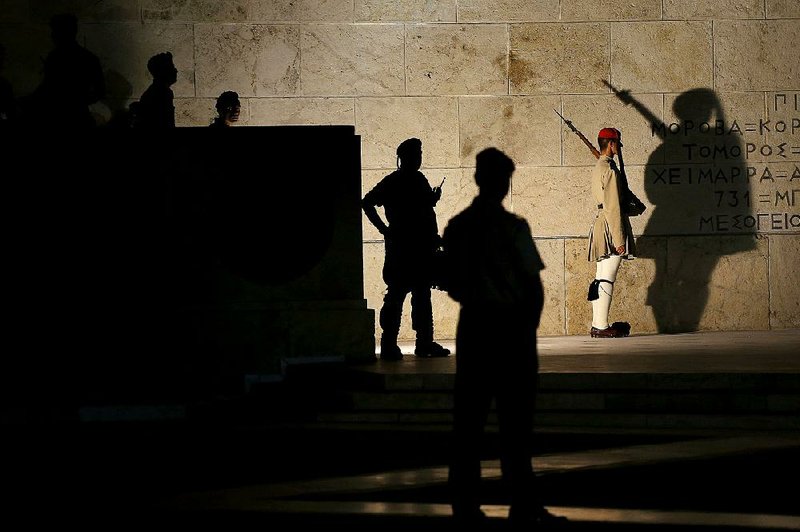BRUSSELS -- European leaders gave Greek Prime Minister Alexis Tsipras a straightforward choice on Sunday: disown his principles or quit the euro.
Euro-area leaders presented Tsipras with a laundry list of unfinished business from previous bailouts he'd pilloried in opposition and during six turbulent months in office. They gave him three days to enact their main demands into Greek law in exchange for the third bailout in five years.
With Greece running out of money and its banks shut the past two weeks, the confrontation came at a summit in Brussels on Sunday that was billed as Greece's last chance to stay in the euro. Greece missed a payment to the International Monetary Fund due June 30 and allowed its second rescue package to lapse the same day.
Tsipras and skeptical European leaders negotiated past a self-imposed deadline into the early hours this morning, with talks stuck on how Greece would guarantee austerity measures in exchange for a rescue package to prevent its banks from collapsing.
Greece's eurozone partners warned that the country could be temporarily forced out of the euro, the European single currency that Greece has been a part of since 2002. No country has ever left the joint currency, which launched in 1999, and there is no mechanism in place for one to do so.
"The situation is extremely difficult if you consider the economic situation in Greece and the worsening in the last few months, but what has been lost also in terms of trust and reliability," German Chancellor Angela Merkel told reporters as she arrived at the summit, but said that "there will not be an agreement at any price."
"The most important currency has been lost: that is trust and reliability," she added.
While the Greek government has yet to comment on the conditions, which were detailed by finance ministers in meetings Saturday and Sunday, an official in Brussels called the document very bad. Germany floated the prospect of suspending Greece from the currency union.
A one-page position paper drafted by the German Finance Ministry suggested that euro-area nations would provide aid during a five-year suspension outside the single currency.
Several officials, all of whom spoke on condition of anonymity because they weren't authorized to discuss the negotiations while they were ongoing, said the terms of the austerity package and the timing of its implementation remained serious obstacles.
One of them said the main difference centered on when the European Central Bank could start to increase its emergency liquidity assistance to Greek banks. Greece shut the teetering banks two weeks ago and has limited the amount people can withdraw from their accounts. Without more liquidity from the central bank, the banks can't reopen without collapsing.
Tsipras wants the central bank to help the banks as early as today, the official said, but creditors don't want the European Central Bank to act until the Greek Parliament passes certain austerity measures. Even if the banks reopen, it's possible that they could run out of cash even for cash-machine withdrawals this week.
Another of the officials said sticking points included a proposal for Greece to transfer as much as $56 billion worth of state assets to an independent fund in Luxembourg under European supervision.
The euro fell as trading opened in Asia, dropping as much as 0.6 percent, and slid 0.3 percent to $1.1126 by 9:18 a.m. in Tokyo. The currency rose 0.4 percent last week as creditors looked to nail down a deal.
In addition to requirements to cut pensions and raise sales tax, which Tsipras accepted last week, the demands included officials from Greece's creditors returning to Athens with full access to government ministers and a veto over relevant legislation, according to the document presented to Tsipras.
After putting up with personal attacks, contradictory messages and an anti-austerity referendum from Athens, euro-area policymakers are pressing home their advantage with Tsipras' resistance running out of fuel.
"I'd like to see them demonstrating starting tomorrow in their Parliament they're serious about implementing the changes, legislative and structural, that need to be put in place," Irish Prime Minister Enda Kenny said. "Every day that this goes on, the eventual solutions are more costly."
Tsipras was elected in January after campaigning to reject austerity. After routinely calling the conditions demanded in exchange for aid "blackmail," he may be forced to organize a government of national unity or call new elections.
"The costs for Greece of staying in the euro are reaching a point where the balance could favor grexit," said Daniel Munevar, who advised former Greek Finance Minister Yanis Varoufakis before he quit last week, using a term for Greek exit from the euro. "The costs being demanded of Greece are so punitive that they are almost impossible to meet."
Arriving in Brussels for the summit, President Francois Hollande of France warned that failure to find an agreement to keep Greece in the euro would "mean a Europe that is in retreat, a Europe that no longer moves forward." France, he added, "will do everything to find an agreement this evening."
Hollande told reporters, "At stake is whether Greece will tomorrow be in the eurozone and also at stake is Europe."
Leaders from Slovakia and Finland backed their allies in Berlin. Slovak Prime Minister Robert Fico said trust in Greece had been lost and an exit was the best option.
"The Greeks would do best if they left the eurozone on their own, did their homework and then tried to come back. This is just torture for everybody," Fico told reporters on a flight from Bratislava.
Backing France, Austrian Chancellor Werner Faymann called the proposal "demeaning and wrong."
Traditionally, eurozone ministers agree by mutual consensus, though in exceptional circumstances a unanimous vote may not be needed.
Greece has received two previous bailouts, totaling $268 billion, in return for deep spending cuts, tax increases and reforms from successive governments. Although the country's annual budget deficit has come down dramatically, Greece's debt burden has increased as the economy has shrunk by a quarter.
The Greek government has made getting some form of debt relief a priority and hopes that a comprehensive solution will involve European creditors at least agreeing to delayed repayments or lower interest rates.
Greek debt stands at around $357 billion -- 180 percent or so of the country's annual gross domestic product. Few economists think that debt will ever be fully repaid. Last week, the International Monetary Fund said Greece's debt will need to be restructured.
Greece has requested $91 billion to $96 billion in new aid, as its financing estimates have ballooned to show debt reaching 200 percent of gross domestic product, Maltese Finance Minister Edward Scicluna said.
Greece will need $25 billion to pay its bills through the end of August, Scicluna said.
Any deal is unlikely to be rubber-stamped before Greece has to pay the European Central Bank $3.9 billion on July 20 and so creditors are seeking to engineer a mechanism to avert a default, according to an official from the European Commission.
The deal on offer is "clearly harsher than what Greece rejected in the referendum last weekend," Finnish Finance Minister Alex Stubb told reporters as the leaders talks began. "It's a rather black and white choice."
European leaders are pushing for Tsipras to legislate before they'll even consider releasing funds because of the credibility gap they said was a key hurdle to more aid. They're no longer willing to take him at his word.
Creditors are using the calendar as leverage. Tsipras's predecessors were given months to enact economic reforms after tapping the first bailout loans in 2010.
Greece would need to pass laws by July 15 to raise sales tax, cut pensions, change the bankruptcy code, safeguard the independence of the statistics office and make spending cuts automatic if the budget misses its target, according to the text presented to leaders.
With Greek banks rationing cash and the European Central Bank reviewing how long it can keep the country's financial system alive, Tsipras won a stay of execution as he arrived at the summit when a Sunday meeting of the 28 European Union leaders was canceled. The full group of leaders would only have gathered to discuss how to handle Greece's exit from the euro, Maltese Prime Minister Joseph Muscat said.
"I am ready for an honest compromise," Tsipras told reporters as he arrived. "We owe it to the people of Europe that want a united, not divided, Europe. We can reach an agreement tonight if the parties involved want it."
Information for this article was contributed by David De Jong, Mark Deen, Jonathan Stearns, Nikos Chrysoloras, Marcus Bensasson, Kevin Costelloe, Rebecca Christie, Patrick Donahue, Ian Wishart, James G. Neuger, Stephanie Bodoni, Ott Ummelas, Karl Stagno Navarra, Radoslav Tomek, Esteban Duarte, Angela Cullen and Elco van Groningen of Bloomberg News; by Menelaos Hadjicostis, Raf Casert, Pan Pylas and John-Thor Dahlburg of The Associated Press; and by Andrew Higgins, James Kanter, Niki Kitsantonis and Alison Smale of The New York Times.
A Section on 07/13/2015

